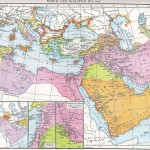
The anti-Muslim rhetoric of Donald Trump and the people that he seeks counsel from has raised a very dangerous specter. Namely that the idea of a civilizational clash between Islam and the West may become the framework for both the foreign and domestic policies of the government of the United States.
Never before has there been a more pressing need to undermine and jettison this unsubstantiated and pro-war narrative. Intellectuals of all faiths and backgrounds must turn their attention to repudiating the already ubiquitous echoes of this dangerous idea before they do more damage than they have already done.
The origins of this idea arose in neoconservative circles during the early nineteen-nineties and were most popularly captured in Samuel Huntington’s 1993 article for “Foreign Affairs” titled “The Clash of Civilizations?”
In retrospect it seems Huntington’s essay provided a veritable theatrical backdrop to the events that have transpired since September 11, 2001. This portrait of a future cleaved by immutable schisms continues to define most public discourse about terrorism and to impress many with what is perceived to be its uncanny prescience. Since the essay was written in 1993 the West has seen multiple acts of religiously themed violence committed by Muslim perpetrators in ostensible reaction to which America has gone to full scale wars in Afghanistan and Iraq. A significant level of military intervention has taken place in Libya and Syria. Drone strikes have been conducted repeatedly in Pakistan, Yemen and Somalia. Many senior Republican politicians have identified Iran as a singular sponsor of terrorism and a threat to the United States. Sections of the media, particularly conservative media, has couched its reporting and commentary on terrorism in the Procrustean bed of irreconcilable cultures and irrepressible global conflicts proposed by Huntington. Cultural relativism and pluralism have been identified as dangerous weaknesses and across Europe and America ultra-nationalism, right-wing populism and xenophobia are on the march.
On the face of it one would think that Huntington’s assertions are proving ominously accurate. On a more objective and hyperbole-free scrutiny however this narrative is found wanting. There is no sign of a pan-Islamic movement against the West; the vast majority of Muslim nation states remain United States allies. Saudi Arabia and Qatar are currently the largest purchasers of American arms. Afghanistan-during the Taliban years-remains the only Muslim majority country to have been taken over by an extremist entity. In Pakistan, Iraq, Syria and Somalia thousands of soldiers have lost their lives fighting terrorist organizations. Over two thousand Iraqi soldiers and Pesh Murga fighters died fighting Daesh across Iraq in November alone. Attacks within Muslim majority countries have constituted and continue to constitute all but a droplet of the casualties from violent extremism. Far from being a civilizational clash between the West and Islam, contemporary terrorism remains mostly internecine feuding and the convulsions of nations recovering from brutal postcolonial dictatorships. Furthermore, other than increased military and economic cooperation between Pakistan and China (which have always been strong partners) there is no sign of a brewing showdown between the West and the “Confucian-Islamic” alliance that Huntington foresaw. In fact the only possibility of a global war comes in the form of the competing realpolitik paradigms of the United States, Russia and China at the flash-points of Syria and the South China Sea.
The insistence of certain media and political quarters to pursue the narrative of Islam Vs the West is dangerous not only because it is fueling hawkishness and bigotry but because if implemented as policy it may sabotage counter-terrorism efforts. As a large study of Daesh personnel published by the Center to Combat Terrorism at West Point last month showed, political motivations appear to be far more prominent than religious ones in motivating terror recruits. The study also found that the vast majority of recruits lacked religious education and had minimal religious knowledge. One of the conclusions of the study was that recruiters target those who lack religious literacy as they are unable to scrutinize the Jihadi doctrine presented to them. With Donald Trump announcing Steve Bannon, Michael Flynn, James Mattis, Frank Gaffney and Jeff Sessions to his administration however the stage is set rather precariously for the future of counterterrorism. Each and every one of these individuals who will be formulating national defense, prosecution and security policy have been vehement proponents of an aggressive religious-ideology focused approach to fighting terrorism. Such an approach is likely to alienate Muslims and ignore the more crucial political-grievance narrative that continues to draw recruits with great potency.
Terrorism continues to wreak havoc across the Middle East, North Africa and South Asia. Each time it reaches Western shores it fuels fear and anger which in turn promotes reactionary politics. This has already caused catastrophic misadventures such as the 2003 Iraq Invasion, the Libyan regime change and the stop-start intervention in Syria. It is time to dispense of the false narrative of civilizational clash before it becomes a self-fulfilling prophecy. America cannot afford any more war; the world cannot afford any more war.
The world has learnt the wisdom of religious, political and cultural pluralism through much bloodshed and misery. In today’s interconnected, economically and militarily globalized world there is no room and no requisite for cultures to go to war. They can, and must, accommodate each other. That is the narrative we need.
















